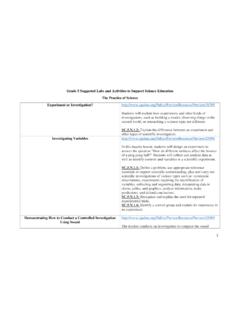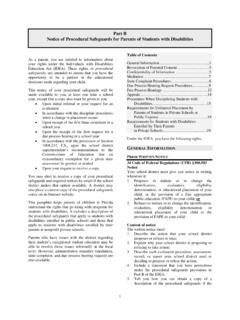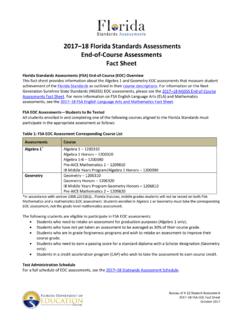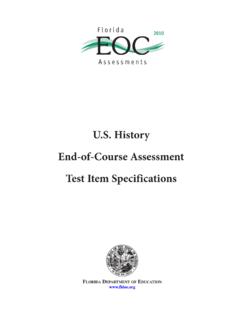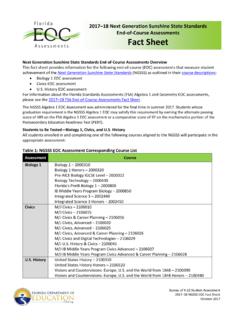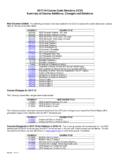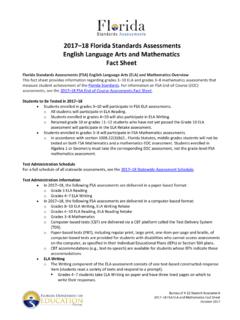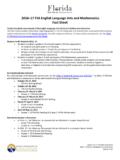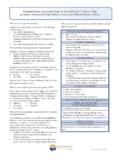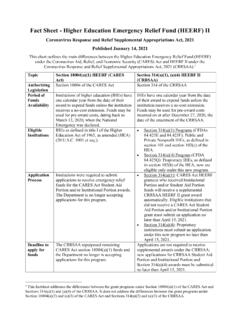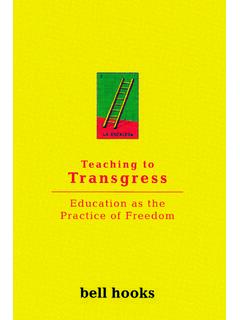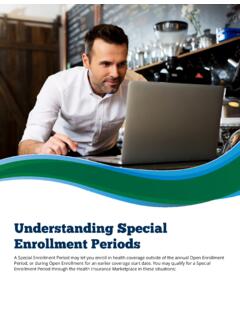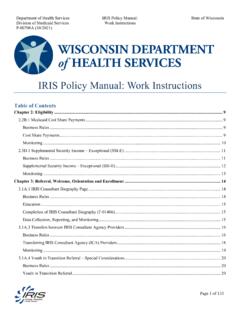Transcription of What Is Exceptional Student Education
1 What Is Exceptional Student Educationfor Children with Disabilities? In florida , children with disabilities who need specially designed instruction and related services are called Exceptional students . The special help they are given at school is called Exceptional Student Education (ESE). The purpose of ESE is to help each child with a disability progress in school and prepare for life after school. ESE services include specially designed instruction to meet the unique needs of the child. ESE services may also include technology devices, therapy, special transportation, or other supports. There is no charge for ESE services. A team of people makes decisions about the child s needs and ESE services. The child s parents are part of this team.
2 This process is based on the requirements of the Individuals with Disabilities Education Act (IDEA). The main steps in the ESE decision-making process are described for Individual Evaluation A referral is a request for a formal review of all the information available about the child s learning needs, strengths, problems, and interests. A team of people, including the parent(s), reviews the information. The team uses a problem-solving process during the review in order to find out what type of instruction works best for the child. The team will decide whether additional evaluation is needed to determine if the child is eligible for ESE services. Individual Evaluation An evaluation includes all the procedures used to gather information about the child.
3 These procedures may include interventions, interviews, observations, and, sometimes, individual tests that are given by a specialist, such as a school psychologist. The team, including the parent(s), makes decisions about which particular evaluation procedures will be used. The parent(s) must sign a consent form before the evaluation process can DeterminationAfter the evaluation, the school holds a meeting called an eligibility staffing. The parent(s) and the rest of the team discuss the information collected about the child. Then the team determines whether the child is eligible for ESE services. To receive ESE services, the child must meet the criteria listed in florida s State Board of Education Are Part of the Team!Teachers and other school staff can answer parents questions about ESE and explain how parents can participate in their child s Education .
4 School staff can also provide information about parents rights and responsibilities in the ESE process. Parents who want more information may contact the school principal or the ESE administrator in the local school district rights of parents in the ESE process are called their procedural safeguards. Parents receive a written summary of their procedural safeguards when they are asked to give their consent for their child to be individually Happens if the Child Is Eligible?Development of the First IEP If the child is eligible for ESE services, the next step is to hold a meeting to write an individual educational plan (IEP). The child s parents are invited to this meeting because they are part of the IEP team. The IEP team decides which special services and supports the child needs in order to make progress and achieve his or her annual goals.
5 The IEP team also decides where the child will receive services. Most children with disabilities spend the majority of their school day in general Education classrooms. Some children leave the general Education classroom for part of the day to receive services in an ESE classroom. A few children spend all day in a special classroom or in a special school. Consent for Services to BeginA child cannot receive ESE services for the first time until the IEP is written and a parent has given written and Revision of the IEPThe IEP team decides how a child s progress will be measured and reported. At least once every 12 months, the IEP team meets to talk about the child s progress and to develop a new IEP. However, because a child s needs may change at any time, the IEP may also be revised at other times.
6 The IEP team generally makes changes to the IEP at an IEP team meeting. However, sometimes the parent(s) and the school district may agree that the IEP can be changed without a meeting. Whenever changes are made to the IEP, the changes agreed to are documented in writing. Parents may request a copy of the revised department of EducationDr. Eric J. Smith, Commissioner311109 This publication was developed and produced by the Bureau of Exceptional Education and Student Services (BEESS), Division of Public Schools, florida department of Education , through federal assistance under the Individuals with Disabilities Education Act (IDEA), Part B. It is available from the BEESS Resource and Information Center (BRIC) and online at: For information on this and other resources please contact website: Bureau website: : (850) 245-0475 Fax: (850) 245-0987E-mail.
